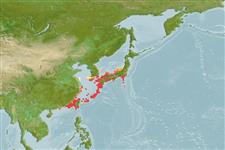Common names from other countries
Environment: milieu / climate zone / depth range / distribution range
Ecologia
marinhas associadas(os) a recifes, usually 2 - 20 m (Ref. 27115). Subtropical; 24°C - 28°C (Ref. 27115)
Northwest Pacific: Matsushima Bay, Japan to Taiwan.
Tamanho / Peso / Idade
Maturity: Lm ? range ? - ? cm
Max length : 50.0 cm TL macho/indeterminado; (Ref. 9710)
Descrição breve
Chaves de identificação | Morfologia | Morfometria
Espinhos dorsais (total) : 9; Raios dorsais moles (total) : 22 - 24; Espinhos anais: 3 - 4; Raios anais moles: 21 - 23. Body roundish in young, becoming ovate with age. Forehead without rostral prominence even in adult. Caudal peduncle relatively deep and compressed without dorsal and ventral precaudal depressions. Four or 5 bony plates are on each side of the caudal peduncle. Posterior 3 or 4 plates with feeble triangular keels.
Often found in groups in shallow, surge rocky areas (Ref. 9710). Anterolateral glandular groove with venom gland (Ref. 57406).
Life cycle and mating behavior
Maturities | Reprodução | Spawnings | Egg(s) | Fecundities | Larvas
Masuda, H., K. Amaoka, C. Araga, T. Uyeno and T. Yoshino, 1984. The fishes of the Japanese Archipelago. Vol. 1. Tokai University Press, Tokyo, Japan. 437 p. (text). (Ref. 559)
Categoria na Lista Vermelha da IUCN (Ref. 130435)
CITES (Ref. 128078)
Not Evaluated
Utilização humana
Pescarias: espécies comerciais; Aquário: Espécies comerciais
Ferramentas
Relatórios especiais
Descarregue XML
Fontes da internet
Estimates based on models
Preferred temperature (Ref.
115969): 17.7 - 26.6, mean 22.5 (based on 96 cells).
Phylogenetic diversity index (Ref.
82804): PD
50 = 0.5078 [Uniqueness, from 0.5 = low to 2.0 = high].
Bayesian length-weight: a=0.01995 (0.00906 - 0.04395), b=3.01 (2.83 - 3.19), in cm Total Length, based on all LWR estimates for this body shape (Ref.
93245).
Nível Trófico (Ref.
69278): 2.0 ±0.00 se; based on food items.
Resiliência (Ref.
120179): Médio, tempo mínimo de duplicação da população 1,4 - 4,4 anos (Preliminary K or Fecundity.).
Fishing Vulnerability (Ref.
59153): Moderate vulnerability (40 of 100).
